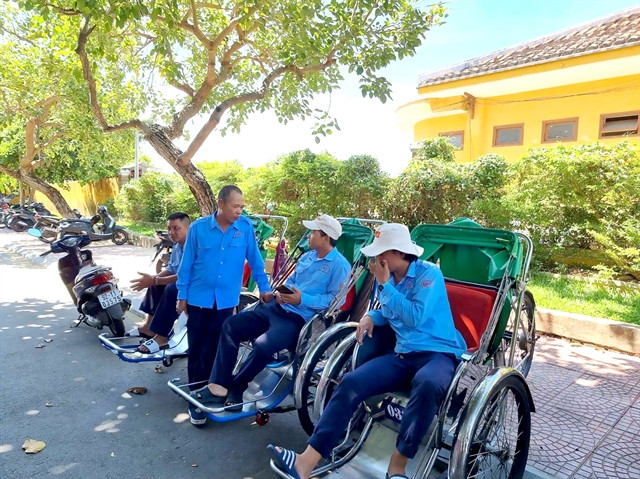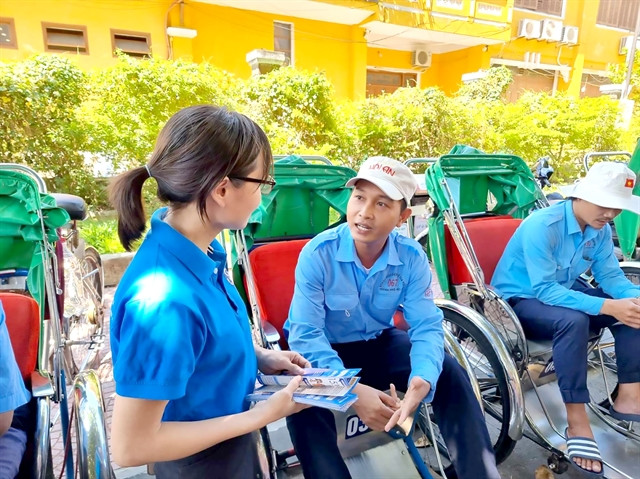 |
| Xích lô (cyclos or pedicabs) drivers in UNESCO World Heritage city of Hội An. — Photos baotintuc.vn |
Trần Ngọc Duy, a 27-year-old xích lô (cyclos or pedicabs) driver in the ancient town of Hội An, has recently enrolled in voluntary social insurance, with the aim of securing a retirement wage for his later years.
Duy allocates approximately 10 per cent of his monthly salary, which amounts to VNĐ800,000, towards this insurance scheme. Notably, his parents have also been contributors to the voluntary social insurance in recent years.
He is not alone in this endeavour; Duy is among the ten members of the Hội An Cultural Pedicab Labour Union who have opted to participate in the voluntary social insurance programme.
Furthermore, an increasing number of freelance workers in Hội An are choosing to dedicate a portion of their monthly earnings to voluntary social insurance, viewing it as a prudent savings strategy for their retirement years.
Phan Phước Tùng, the 58-year-old president of Hội An’s Cultural Pedicab Labour Union, shared that he became aware of the voluntary social insurance scheme a year ago. This came after consultation sessions that were organised with representatives from the city's Labour Confederation and Social Security Agency.
“I found out about a type of social welfare supported by the State and giving us a retirement wage if we join for a specific time,” he said.
“I spent time learning the rate and period of payment as well as rights and benefits. Based on my current wage, I have selected a level of payment relevant to my family’s circumstances,” he told Tin Tức (News) newspaper.
Tùng also encouraged his colleagues to join.
“Depending on their awareness and practical needs, members will have a choice when to join. If I had known about voluntary social insurance earlier, I would have joined earlier to get a pension later,” he said.
Cyclo drivers in Hội An now have a monthly income of around VNĐ8-10 million (US$334 - $418). To be eligible for voluntary social insurance, drivers must have a stable income and contribute to social insurance for 20 years, which is quite a long time and makes many drivers hesitate.
Nguyễn Tiến Mạnh, a 32-year-old driver who has worked for six years, said: “I have not participated in voluntary social insurance because I am considering the payment rate and benefits.”
“I joined compulsory social insurance earlier when I was a factory worker, so I know compulsory social insurance offers more preferential policies,” he said, expecting more benefits added to the amended social insurance law to attract more freelance labourers to join.
With a monthly wage of VNĐ10 million, Huỳnh Tân, a 47-year-old cyclo driver, is also hesitating due to the financial burden of raising two children.
“I will consider participating in voluntary social insurance when there is a new stable policy which targets self-employed workers,” he said.
 |
| A member of the local social security agency tells the benefits and rights of voluntary social insurance to a cyclo driver in Hội An. |
The Hoài River’s Swimming Boat Labour Union, which represents local tourism boat riders, has similarly encouraged its nearly 300 members to voluntarily enrol in social insurance.
Lê Vương, the head of the union, reported that the union currently has 16 members who have opted to join the voluntary social insurance scheme.
In order to motivate freelance labourers to participate, Vương emphasised the importance of informing them of the benefits they would receive.
Both the leaders of Hội An’s Pedicab Labour Union and the Swimming Boat Labour Union concur that effective communication to shift awareness is paramount. They believe that this is the key strategy to inspire local labourers to voluntarily sign up for social insurance.
Tùng, president of Hội An’s Cultural Pedicab Labour Union, said: “As I have to pay social insurance for 20 years to enjoy retirement wage, I only get the wage when I am 77 years old. I hope the payment period will be reduced to 15 years so that I can get retirement wage at the age of around 70.”
Insurance payment is now supported by the State and Quảng Nam Province’s authorities at the rate of 5 per cent.
Tùng expected the assistance would last after 2025 so that “freelance labourers like us have the motivation to continue to join the insurance,” he said.
Lê Vương, president of the Hoài River’s Swimming Boat Labour Union, has proposed that the voluntary social insurance scheme should include a maternal leave provision for female labourers.
In addition to this, Nguyễn Văn Lanh, the vice chairman of the Hội An City People’s Committee, stated that beyond communication campaigns, the effort to encourage freelance labourers to join the social insurance scheme also requires improvements to local livelihoods.
“When they have a stable income, they will voluntarily spend part of their wage on social insurance,” he said.
Ninety per cent of labourers' work in Hội An is either directly or indirectly connected to the tourism sector. The city's tourism has rebounded to approximately 60 per cent following the COVID-19 pandemic, and is anticipated to essentially recover by the end of this year, with expectations of accelerating growth into the next year, according to the vice chairman of the Hội An Town People’s Committee.
This recovery, he stated, will serve as a foundation to ensure social welfare, which includes the development of beneficiaries for the voluntary social insurance scheme.
Lanh further noted a policy that mandates all business households to enroll in compulsory social insurance, suggesting that this will expand the scope of social welfare coverage. This is particularly significant given that Hội An is home to up to 9,000 individual business households.
He emphasised that the support policy of the State should be consistently maintained, as it provides not only financial backing but also fosters trust among labourers, affirming a commitment to stand with them for their overall wellbeing. VNS